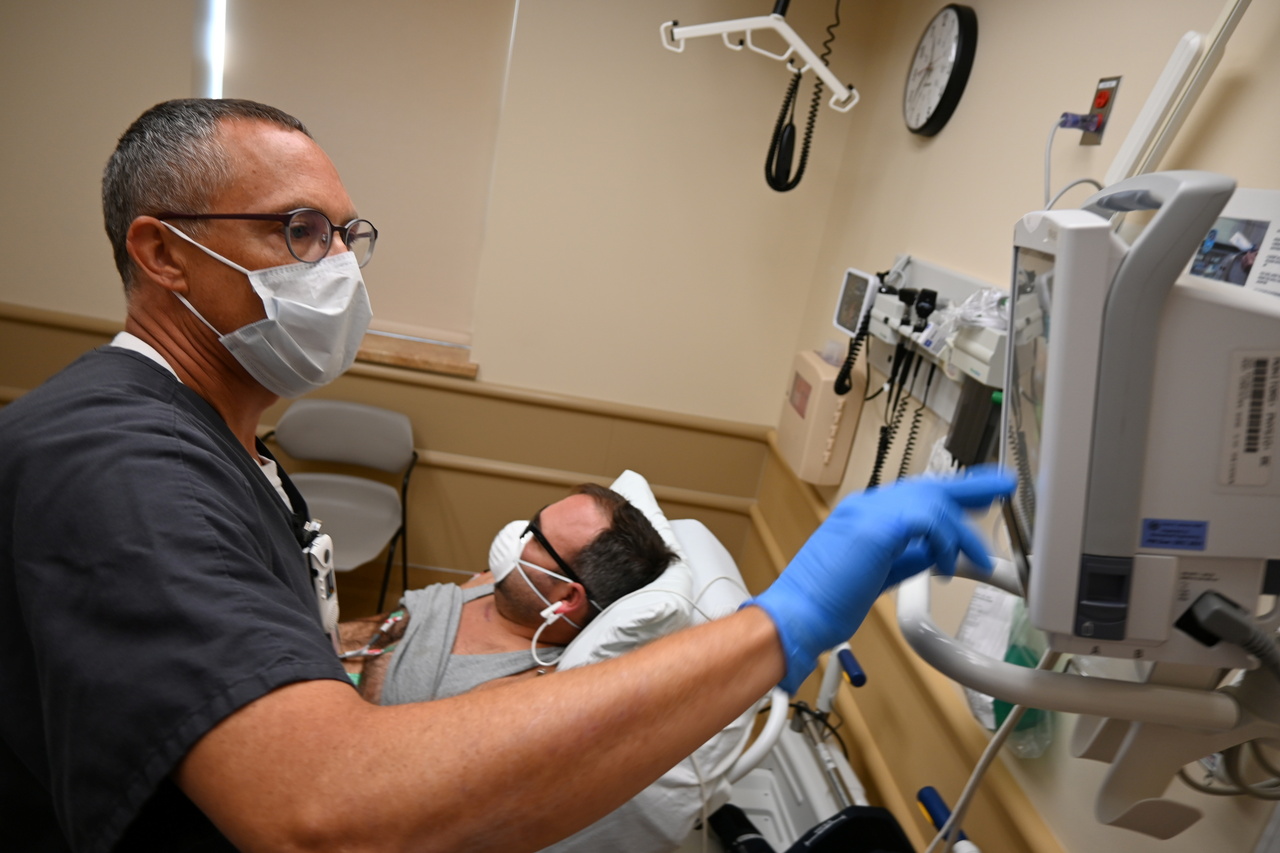US hospitals seek military help in Michigan amid Covid-19 overflow
Sign up now: Get ST's newsletters delivered to your inbox

Michigan's hospitals have asked the US Department of Defence to provide emergency staff.
PHOTO: REUTERS
Follow topic:
MICHIGAN (BLOOMBERG) - Henry Ford Health System has seen Covid-19 cases soar by 50 per cent in three weeks, straining staff and care at the Detroit-based network of five major hospitals in the United States' southeast Michigan.
On Tuesday (Nov 23), statewide Covid-19 hospitalisations reached 4,085, approaching the record of 4,640 set in April 2020 at the onset of the pandemic.
Michigan's hospitals, with the help of Governor Gretchen Whitmer, have asked the US Department of Defence to provide emergency staff, said Mr Brian Peters, chief executive officer of the Michigan Health & Hospital Association.
The state is the latest US hot spot, with a seven-day case rate of more than 600 per 100,000 - triple the national average. Covid-19 patients are overflowing into hallways and conference rooms, according to the hospital association, and the vast majority of those needing intensive care and ventilators are unvaccinated.
"Our emergency departments and our hospitals are functioning beyond full capacity," Dr Adnan Munkarah, Henry Ford's chief clinical officer, said in an interview. "That means our beds are full and we have patients waiting in the emergency department for hours for beds to open."
Nearly two years into the coronavirus pandemic, the US is struggling with yet another surge. The nation is reporting more than 90,000 new infections a day, 23 per cent more than a month ago. Eighteen states - including Wyoming, Pennsylvania, Nebraska and New Hampshire - have more ICU patients with confirmed or suspected Covid-19 than a year ago.
White House coronavirus response coordinator Jeff Zients said on Monday that the US isn't headed for Covid-19 lockdown measures like those imposed by some European Union countries in response to recent outbreaks.
Vaccines, booster shots and therapeutics will "accelerate the path out of this pandemic", Mr Zients said on a conference call.
Still, more than 40 per cent of the US is not fully vaccinated. For those who are, efficacy is waning, and just 18 per cent have received booster doses. Meanwhile, the drawn-out pandemic is taxing hospital ICUs and hospital workforces, resulting in unprecedented labour shortages.
Patients and family members have sometimes attacked health workers in frustration over long wait times, strict infection rules and scant resources, Mr Peters said.
"We have burnt through a whole generation of health-care workers," said Dr Eric Toner, a senior scholar with the Johns Hopkins Centre for Health Security who specialises in hospital preparedness. "More often than not the reason that the intensive-care units are overwhelmed is they don't have staff."
Hospitals have been exploring multiple strategies to boost staff, said Ms Nancy Foster, the American Hospital Association's vice-president of quality and patient safety policy. That includes redeployment from less hard-hit areas within larger hospital systems and using federal workers, she said.
The Defence Department this week sent a team of about 20 nurses, respiratory therapists and other professionals to help staff the University of Colorado Health's Poudre Valley Hospital in Fort Collins. In Minnesota, Governor Tim Walz is deploying the state's National Guard to help fill gaps in skilled nursing.
Michigan's Governor Whitmer, who enacted some of the toughest early restrictions in the US to slow the spread of Covid-19 in 2020, has so far resisted reinstating them. She said on Monday that her administration may provide some guidance ahead of Thursday's Thanksgiving holiday.
"The situation right now is as dire as it has been for our hospitals since the start of the pandemic," Mr Peters, the hospital group CEO, said in an interview. "The hot spot is literally the entire state: It's rural, it's urban, it's everywhere."
Dr Toner, the Johns Hopkins preparedness expert, said he expects the latest wave of the infection, along with staffing shortages, mean it will take fewer Covid-19 hospitalisations to overwhelm the system. The flu season is just getting started and could cause further stress.
Last week, the US Centres for Disease Control and Prevention dispatched a team to investigate a cluster of 528 cases of the flu seen at the University of Michigan-Ann Arbor campus since Oct 6. About 77 per cent were in unvaccinated people.
"I think we will see hospitals and ICUs in many places stretched to the limit," Dr Toner said.
About 54 per cent of Michigan's population is fully vaccinated against Covid-19, well below the US average of 59 per cent.
"We knew if we didn't get a high vaccination rate, we would be dealing with another surge," Henry Ford's Dr Munkarah said. "And unfortunately, we are living it."
As of Monday, the unvaccinated made up 72 per cent of Henry Ford's Covid-infected patients, 86 per cent of Covid-19 ICU patients and 89 per cent of Covid patients on a ventilator. Henry Ford has not yet started cancelling elective surgeries or non-urgent care, but that is a possibility, Dr Munkarah said.
"If the numbers continue to climb as we are seeing them, we are going to get to the point where we need to have significant rescheduling of cases and probably slowing down some of the non-emergent or urgent activities," he said.
Colorado had 1,565 people hospitalised with Covid-19 as of Nov 22, and 95 per cent of its ICU beds in use.
On Tuesday, Denver renewed its mask mandate, with Denver Health CEO Robin Wittenstein warning that the health-care system "is on the brink of collapse".
"It's one thing to fight a battle that's very intense but short-lived," said Mr Peters, the Michigan hospital group CEO. "This has been a battle that has now been waged for going on two years."

